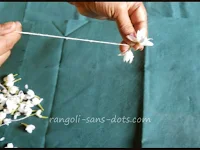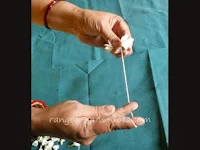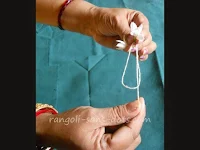How to string flowers kakada flower
I had written earlier on jasmine an easy simple method of making jasmine garland using a needle and thread.
In fact what we get is a densely set floral garland.
Stringing of roses is difficult because the petals are delicate and tend to fall when we try to string roses.
The roses should be fresh and used within a few hours.
Hence it is better to string roses when they are fresh
Coming to jasmine, stringing them is difficult because the stalk is thin and small
( initially it is better to learn stringing leaves or flowers with long stalk
It is easier to string the jasmine flowers when they are buds.
Once they bloom it is slightly difficult as the petals interfere with stringing process.
Usually, the jasmine buds are strung and the garland is stored in a piece of clean cloth made slightly wet with water
so that the flowers bloom the next day.
Too wet a cloth will result in the flowers getting damaged.
There is a variety of jasmine called mullai in Tamil for which the stringing process is also the same except the cloth
is made very wet for the flowers to bloom.
Nature has its own way for different flowers! Jasmine is white but is one of the most fragrant flowers and hence used for festivals
. I have four jasmine plants that bloom every day. I get a few flowers and I offer them during regular prayer. In Tamil Nadu Madurai is famous for jasmine and Madurai malli as it is called is quite popular.
I have used a flower for kakada to demonstrate how to get this thick garland
First image shows to flowers placed one above the other with stalks over lapping, the string at the bottom
The third image shows the beginning of the formation of the knot using the fingers as shown, rolling them over the string, along the string then with the middle finger supporting the string roll the wrist around the string to get the position shown in the fourth image.
This is the most difficult part in this process as it involves rotating the fingers and wrist in different planes.
The fifth image shows the formation of the ring which is inserted on the top of the flower as shown in the sixth image so that the the ring is over the overlapping stalks.








